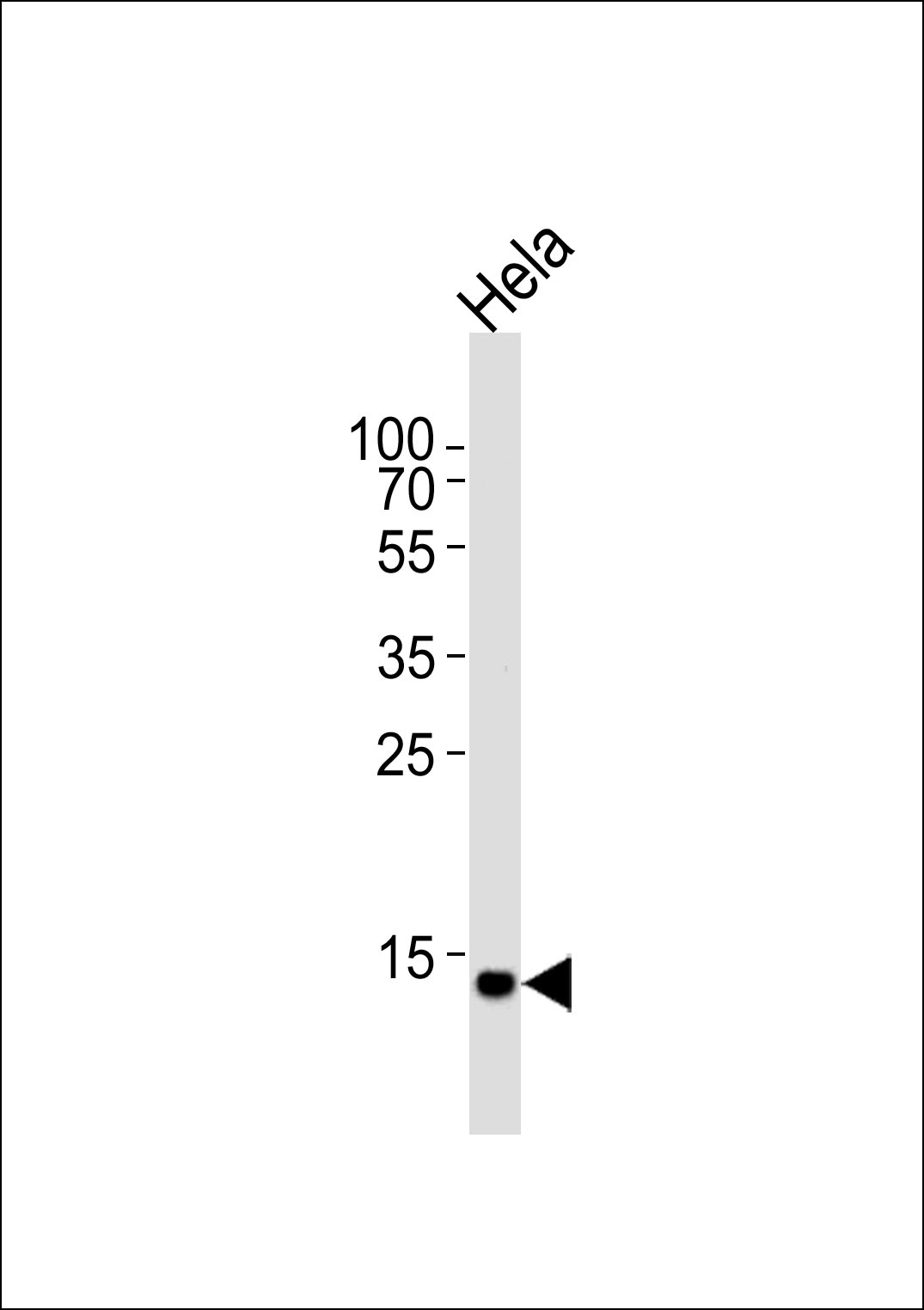UBE2D2 Antibody (C-term)
Affinity Purified Rabbit Polyclonal Antibody (Pab)
- SPECIFICATION
- CITATIONS
- PROTOCOLS
- BACKGROUND

Application
| WB, E |
|---|---|
| Primary Accession | P62837 |
| Other Accession | P62840, P62839, P62838, Q1RMX2, NP_003330.1, NP_862821.1 |
| Reactivity | Human |
| Predicted | Bovine, Mouse, Rat, Xenopus |
| Host | Rabbit |
| Clonality | Polyclonal |
| Isotype | Rabbit IgG |
| Calculated MW | 16735 Da |
| Antigen Region | 112-140 aa |
| Gene ID | 7322 |
|---|---|
| Other Names | Ubiquitin-conjugating enzyme E2 D2, Ubiquitin carrier protein D2, Ubiquitin-conjugating enzyme E2(17)KB 2, Ubiquitin-conjugating enzyme E2-17 kDa 2, Ubiquitin-protein ligase D2, p53-regulated ubiquitin-conjugating enzyme 1, UBE2D2, PUBC1, UBC4, UBC5B, UBCH4, UBCH5B |
| Target/Specificity | This UBE2D2 antibody is generated from rabbits immunized with a KLH conjugated synthetic peptide between 112-140 amino acids from the C-terminal region of human UBE2D2. |
| Dilution | WB~~1:1000 |
| Format | Purified polyclonal antibody supplied in PBS with 0.09% (W/V) sodium azide. This antibody is purified through a protein A column, followed by peptide affinity purification. |
| Storage | Maintain refrigerated at 2-8°C for up to 2 weeks. For long term storage store at -20°C in small aliquots to prevent freeze-thaw cycles. |
| Precautions | UBE2D2 Antibody (C-term) is for research use only and not for use in diagnostic or therapeutic procedures. |
| Name | UBE2D2 |
|---|---|
| Synonyms | PUBC1, UBC4, UBC5B, UBCH4, UBCH5B |
| Function | Accepts ubiquitin from the E1 complex and catalyzes its covalent attachment to other proteins (PubMed:10329681, PubMed:18042044, PubMed:18703417, PubMed:20061386, PubMed:20403326, PubMed:20525694, PubMed:26475854, PubMed:28322253). Catalyzes 'Lys-48'- linked polyubiquitination (PubMed:10329681, PubMed:18042044, PubMed:18359941, PubMed:18703417, PubMed:20061386, PubMed:20403326, PubMed:20525694, PubMed:26475854). Mediates the selective degradation of short-lived and abnormal proteins (PubMed:10329681, PubMed:18042044, PubMed:18359941, PubMed:18703417, PubMed:20061386, PubMed:20403326, PubMed:20525694, PubMed:26475854). Functions in the E6/E6-AP-induced ubiquitination of p53/TP53 (PubMed:15280377). Mediates ubiquitination of PEX5 and SQSTM1 and autoubiquitination of STUB1 and TRAF6 (PubMed:18359941, PubMed:28322253). Involved in the signal-induced conjugation and subsequent degradation of NFKBIA, FBXW2-mediated GCM1 ubiquitination and degradation, MDM2-dependent degradation of p53/TP53 and the activation of MAVS in the mitochondria by RIGI in response to viral infection (PubMed:18703417, PubMed:20403326). Essential for viral activation of IRF3 (PubMed:19854139). |

Thousands of laboratories across the world have published research that depended on the performance of antibodies from Abcepta to advance their research. Check out links to articles that cite our products in major peer-reviewed journals, organized by research category.
info@abcepta.com, and receive a free "I Love Antibodies" mug.
Provided below are standard protocols that you may find useful for product applications.
Background
The modification of proteins with ubiquitin is an important cellular mechanism for targeting abnormal or short-lived proteins for degradation. Ubiquitination involves at least three classes of enzymes: ubiquitin-activating enzymes, or E1s, ubiquitin-conjugating enzymes, or E2s, and ubiquitin-protein ligases, or E3s. This gene encodes a member of the E2 ubiquitin-conjugating enzyme family. This enzyme functions in the ubiquitination of the tumor-suppressor protein p53, which is induced by an E3 ubiquitin-protein ligase. Two alternatively spliced transcript variants have been found for this gene and they encode distinct isoforms.
References
Bailey, S.D., et al. Diabetes Care 33(10):2250-2253(2010)
Wu, K., et al. Mol. Cell 37(6):784-796(2010)
Vina-Vilaseca, A., et al. J. Biol. Chem. 285(10):7645-7656(2010)
Sakata, E., et al. Structure 18(1):138-147(2010)
Kamadurai, H.B., et al. Mol. Cell 36(6):1095-1102(2009)
If you have used an Abcepta product and would like to share how it has performed, please click on the "Submit Review" button and provide the requested information. Our staff will examine and post your review and contact you if needed.
If you have any additional inquiries please email technical services at tech@abcepta.com.














 Foundational characteristics of cancer include proliferation, angiogenesis, migration, evasion of apoptosis, and cellular immortality. Find key markers for these cellular processes and antibodies to detect them.
Foundational characteristics of cancer include proliferation, angiogenesis, migration, evasion of apoptosis, and cellular immortality. Find key markers for these cellular processes and antibodies to detect them. The SUMOplot™ Analysis Program predicts and scores sumoylation sites in your protein. SUMOylation is a post-translational modification involved in various cellular processes, such as nuclear-cytosolic transport, transcriptional regulation, apoptosis, protein stability, response to stress, and progression through the cell cycle.
The SUMOplot™ Analysis Program predicts and scores sumoylation sites in your protein. SUMOylation is a post-translational modification involved in various cellular processes, such as nuclear-cytosolic transport, transcriptional regulation, apoptosis, protein stability, response to stress, and progression through the cell cycle. The Autophagy Receptor Motif Plotter predicts and scores autophagy receptor binding sites in your protein. Identifying proteins connected to this pathway is critical to understanding the role of autophagy in physiological as well as pathological processes such as development, differentiation, neurodegenerative diseases, stress, infection, and cancer.
The Autophagy Receptor Motif Plotter predicts and scores autophagy receptor binding sites in your protein. Identifying proteins connected to this pathway is critical to understanding the role of autophagy in physiological as well as pathological processes such as development, differentiation, neurodegenerative diseases, stress, infection, and cancer.


